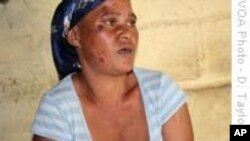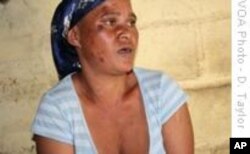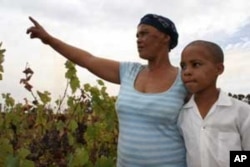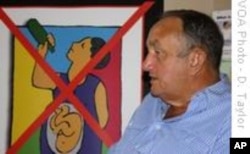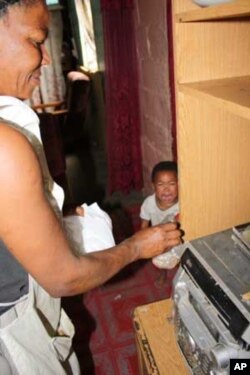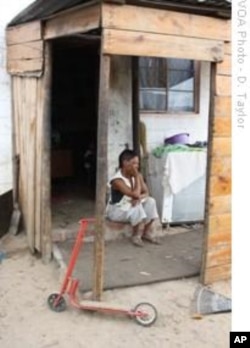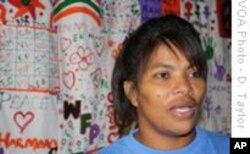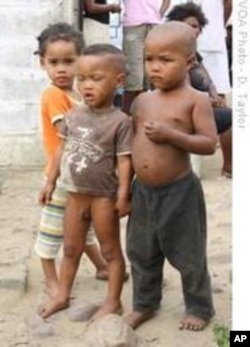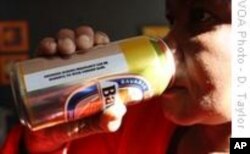Sanna Winston remembers the first time alcohol passed her lips.
“It tasted terrible. It burned. It hurt,” she recalls.
Winston was “five or six” years old.
“My stepmother forced me to drink wine, so that I would be too scared to tell my father what she was doing behind his back. She used to say, ‘If you tell your father, I will tell him that you drank as well, and then we will both get a hiding from him.’ So I kept quiet.”
Today, the 38-year-old mother of five is enduring the consequences of her childhood trauma.
“I am a drinker. If someone makes me angry, or I get sad, then I drink a hell of a lot. Then I drink until the people see that I am totally drunk,” Winston acknowledges.
She lives in a small house, its windows broken and its walls peeling plaster, on a farm at Wellington in South Africa’s Western Cape province. The town’s in the heart of the country’s famed wine lands. The area is a kaleidoscope of beauty, with craggy gunmetal and russet mountains rising out of verdant vineyards and multicolored fruit plantations.
“The tourists who come here only see the pretty things. They don’t see us. We are kept hidden. We are disgraceful,” Winston mumbles, leading her 8-year-old daughter, Francisca, through a field of purple grapes.
As the girl gambols off down a gravel road to join her friends, Winston sighs, “Francisca is not like my other children. She’s not good at school.”
The mother pauses.
“With Francisca, when I got pregnant with her, I was drinking a lot, so bad that I lay on the ground drunk. I can see now that Francisca’s head is damaged,” she whispers. “Doctors have told me my girl has fetal alcohol syndrome.”
Experts say the disease, also known as FAS, is the most common preventable cause of mental retardation in the world. When mothers drink alcohol while they’re pregnant, their babies often suffer enduring physical and mental harm – including heart defects, stunting, diminished intelligence and behavioral problems. South Africa has the highest rate of FAS in the world. In some areas of the country, it affects up to 120 children out of every thousand.
Winston says her daughter has “bad memory” and “thinks very slowly.” She blames herself for the child’s condition. Winston says, “Francisca makes me think very badly about myself, about why I did such a terrible thing to her, drinking while she was inside me. My other children are not damaged like her. She’s my last baby; I can’t have any more children. Then I think, ‘Oh, God, why?’”
Alcohol ‘extremely poisonous’ to babies
According to Professor Dennis Viljoen, an international authority on fetal alcohol syndrome, Francisca shows some of the “classic” symptoms of the affliction he brands a “field of human disaster” and the “most common birth defect in South Africa by far.”
“The current wisdom is that probably any alcohol affects a baby adversely. Any amount,” stresses Viljoen, who’s a pediatrician, a medical geneticist and head of the Foundation for Alcohol Related Research (FARR) in Cape Town.
Alcohol, he says, is “extremely poisonous” to an unborn baby. “What it does is it disrupts tissue formation, particularly in the brain, to such an extent that children suffer serious neurological consequences. They may also suffer organ defects, such as problems with their hearts and kidneys.”
Viljoen says some children with FAS suffer physical deformities, while others appear “on the surface” to be “perfectly normal.”
He explains that many FAS children, while looking “just like any other child,” perform badly at school. They’re hyperactive and can’t concentrate, and are less intelligent than other youngsters. He says, “Simply put, their brains are smaller” as a result of damage from the alcohol that their mothers drank while pregnant with them.
Viljoen adds that some children are “easily recognizable” as suffering from FAS, having small heads and eyes set wide apart, and being much shorter than other children of their age, as the alcohol has stunted their growth. He says in these cases FAS is a “growth deficiency in all aspects of the body; these children are much smaller in all aspects.”
Winston says when her daughter was born the child was indeed “very small. She looked shriveled up. I got a big fright,” she remembers. Then, tears fill the mother’s tired brown eyes.
“At the hospital, my friend told me, ‘That’s a monster, that’s not a child.’ I almost killed the baby when my friend said that. Then I told myself, ‘No. I Believe in God. This is a human being, this child... .’”
Besides having physical problems, says South African public health researcher, Kirstie Rendall-Mkosi, children suffering from FAS often drop out of school and join criminal gangs.
“These children tend to have poor social judgment. They’re very friendly, and they don’t easily learn social norms and cues and are easily persuaded to do things they shouldn’t do,” she says. “They are more easily absorbed into a gang culture and may not be the gang bosses, but may be more the foot soldiers.”
‘Live by the sword….’
In South Africa’s capital city, Pretoria, Rendall-Mkosi is doing groundbreaking research into FAS. She wants the government to accept her findings and to implement nationwide policies to prevent the syndrome. Her work is sponsored by the United States Centers for Disease Control.
“Ideally, our project would suggest that women only ever practice sensible drinking, which is really limited drinking at any point in time, and that they don’t ever indulge in binge drinking,” Rendall-Mkosi says. But she knows that in her country, with its high rates of extreme poverty and brutal violence, she’s sometimes fighting a losing battle.
Professor Viljoen has a similar reaction. He states, “These folk have terrible lives and they live at the bottom end of the spectrum of welfare and general social being. And at the same time, they want to feel relieved from the burdens of their everyday life…and will [therefore] partake of alcohol.”
Back in her disheveled room on the farm at Wellington, Sanna Winston points to furious, black bruises and inflamed bumps on her face and head. “I look like this because a few weeks ago, I went to visit my niece, and they had a box of wine there. We drank. Then my boyfriend got very angry, because he didn’t want me to drink with anyone but him,” she explains, fingering a row of scabs laddered on her neck.
Winston says her partner “pulled” her away from the party. “Then I stumbled along the road. I fell. He kicked me in the head and dragged me. My body looked terrible. The next day I looked like someone who had been raped,” she sobs.
Everywhere on the region’s farms and in the Cape’s urban sprawls, there are people for whom violence has become a natural state. At the center of the viciousness is alcohol.
“I miss my former husband. He never lifted his hands to me. All he did was once he stabbed me when we were drinking,” Winston matter-of-factly announces, her arms bearing the raised welts of past knife wounds.
When she’s asked where her former husband is now, she says blandly, “Dead. Another farm worker here stabbed him with a messie [little knife]. He died drunk.”
Then, as if to further emphasize the aggression that’s part of life in these communities, Winston says, “Live by the sword, die by the sword.”
Her friend, Annie Demas, interjects, “The men here are often out of work. There’s no money. No proper housing. Nothing nice. No entertainment. Life is so boring. The only joy in life is when we drink.”
Winston adds, “Or when we watch Days of our Lives (an American soap opera),” as the blare from an old television set rises to a crescendo.
Demas fires back, “Only if it’s a good episode. Days is not like it used to be.”
“Ja [yes], I suppose you’re right,” Winston concedes.
Then, another resident of the settlement pokes her head around the corner to interrupt.
“Maybe the only reason that you people here suip [guzzle] so much wine is because you watch Days non-stop. If I watched so many episodes of that kak [rubbish], I’d also want to be drunk all the time.”
For the first time today, the women laugh.
‘We are killing our own….’
At Stellenbosch, the town that’s the traditional home of South Africa’s wine industry, Sharon Messina is a fieldworker with the Women on Farms Project. She blames ever-increasing numbers of illegal drinking dens – or shebeens – and the legacy of a system known as the “dop” for the proliferation of children with fetal alcohol syndrome. “Dop” is a slang Afrikaans word meaning “a drink of alcohol.”
Under the “dop” system, some South African farmers paid their laborers not with money, but with wine. The practice was widespread during apartheid. The “dop” has since been outlawed but has left a devastating legacy. Today, alcoholism is deeply engrained in the communities of the Western Cape in particular.
Messina says farm laborers get low wages. Some use the little money they have to support their families. Others drink it “all gone.” Shebeen owners then extend credit to the workers. This, says Messina, ensures that the laborers are in “constant debt.”
She maintains, “The dop lives on. Only now, it’s not the farmers who are enslaving the farm people to the alcohol…. It’s our own people who operate the shebeens on the farms and in the townships. We are now killing our own.”
Professor Viljoen says cheap alcohol is common in South Africa, and the “shebeen system doesn’t help.” Again, poverty is at the root, he emphasizes.
“The shebeen system is one of informal taverns dispensing alcohol because there’s lack of employment opportunities, particularly in the rural areas. So people open up shebeens to try to make a living. De Aar [a town in the Northern Cape province] for instance has 95 shebeens in a population of 28,000. That’s an incredible number of outlets, right next to the individuals using the alcohol.”
‘Women put wine in their babies’ bottles….’
In some communities in South Africa, especially in the Western and Northern Cape, says Viljoen, alcohol abuse is “almost a badge of honor,” even among women.
“Unlike other communities, where women who drink a lot are shunned, the more you drink here, the more you’re accepted. I often hear people saying, ‘She can drink like a man….’ They mean it as a compliment.”
Messina says she counsels many women who want to stop drinking but there’s “no support system within their families and their communities to encourage rehabilitation. In fact, it’s quite the opposite. All the structures encourage and support and approve of more drinking, because you’re seen as an outsider if you don’t participate in all the drinking parties.”
Messina says the alcohol abuse leads to unsafe sex and “many, many unplanned for and unwanted children,” and “no doubt” contributes to rising rates of fetal alcohol syndrome and HIV infection.
But Viljoen says the ubiquity of alcohol in South Africa means that some women regard it as “harmless….I have sat in shebeens and watched women put wine in their baby’s bottles. They give them wine to keep them quiet.”
In South Africa, manufacturers of alcohol products are compelled by law to put labels on their packaging warning that alcohol can damage health. But Rendall-Mkosi says this doesn’t keep pregnant women from drinking.
“I’m not convinced that people pay much heed to what’s written on the bottle if it’s their favorite drink,” she says. Viljoen is even more dismissive of labeling, calling it an “appeasement of government’s conscience.”
The state’s “real focus,” the doctor maintains, “should be on the ground, investing millions in informing people in clear language about why it’s so dangerous to drink so much alcohol. In any case, many people in these communities are illiterate, so they can’t read the labels in the first place.”
Rendall-Mkosi’s convinced that the government isn’t recognizing the “huge” extent of the FAS problem in South Africa. The health workers agree that unless poverty declines and people get jobs and better housing, Fetal Alcohol Syndrome will continue to cut a devastating swathe across the country.
The government says it’s doing all it can to educate people, including mothers, about the dangers of excessive alcohol use and is providing social grants to poor people in areas affected by FAS. But Viljoen says the money’s often used “purely to supplement people with alcohol.”
“We need to bombard these communities with information, not just money!” he exclaims.
As a start, Rendall-Mkosi wants the state to provide high quality family planning services to prevent children from being born with FAS. “Contraception should be offered to the women so that they’re not having babies at regular intervals,” she says.
On the farm in Wellington, Sanna Winston clearly loves her daughter. “Francisca is everything to me,” the woman murmurs.
“We’re heading to the promised land, the promised land!” Francisca hums, when her mother asks her to sing the song she learned in class today.
But for many who live in South Africa’s magnificent wine lands, and elsewhere in communities ravaged by fetal alcohol syndrome across the nation, the promise at the moment is only of more misery ahead.
This is part 14 of our 15 part series, A Healthy Start: On the Frontlines of Maternal and Infant Care in Africa




